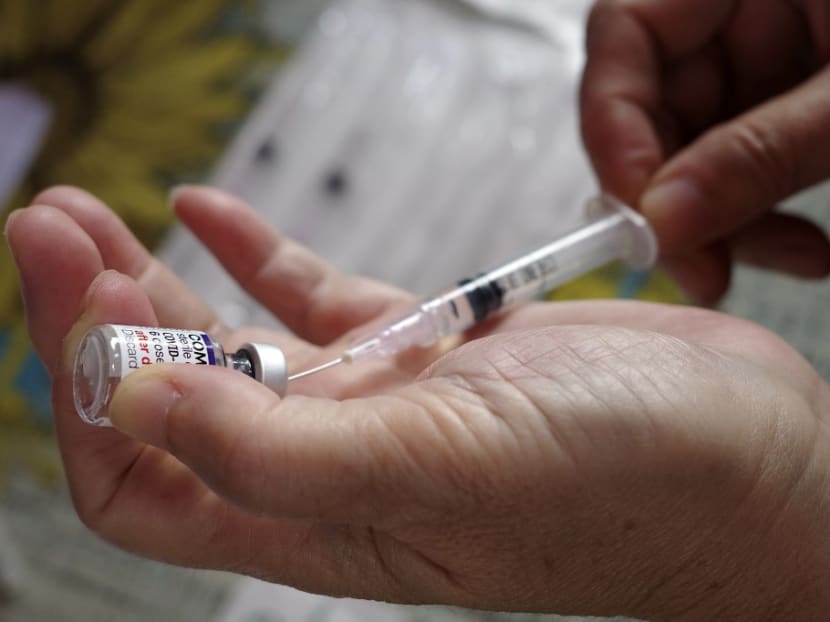S$140m of expired Covid-19 vaccines was 'insurance' to avoid catastrophic economic impact, more deaths: Ong Ye Kung
SINGAPORE — About 15 per cent of Singapore's Covid-19 vaccine doses worth S$140 million have expired, Health Minister Ong Ye Kung said in Parliament on Tuesday (March 21), calling it a price the country was prepared to pay.

Mr Ong Ye Kung said Singapore had "deliberately over-procured" to mitigate the uncertainty of selected vaccine candidates not working, and the possibility of supply chains being disrupted.
SINGAPORE — About 15 per cent of Singapore's Covid-19 vaccine doses worth S$140 million have expired, Health Minister Ong Ye Kung said in Parliament on Tuesday (March 21), calling it a price the country was prepared to pay.
"The expiry of unused vaccines was an insurance premium — the price we were prepared to pay to stave off the risk of catastrophic consequences," he added.
Mr Ong noted that before Covid-19 vaccines became available, Singapore resorted to implementing a "circuit breaker" in April 2020 in a bid to contain the pandemic.
"The two-month circuit breaker cost us around S$11 billion in terms of GDP loss. And we spent close to another S$60 billion over two financial years to cushion the hardship for businesses and workers, not to mention all the heartaches, the difficulties families had to go through," he said.
"Without vaccines, we would certainly have had to resort to further circuit breakers during the Delta and Omicron waves of late 2021 and then throughout 2022. But we did not have to, because the vaccines — we got them early, and they protected us.
"More importantly, our approach averted many deaths due to Covid-19 infections and protected Singaporeans."
Speaking during the debate on the White Paper on Singapore's response to Covid-19, the Health Minister said Singapore had "deliberately over-procured" to mitigate the uncertainty of selected vaccine candidates not working, and the possibility of supply chains being disrupted.
And this meant having spare vaccine stock, which would expire.
The White Paper, which drew on a review conducted by former head of civil service Peter Ho, concluded that Singapore's Covid-19 vaccine strategy paid off.
The Government recognised “very early on” that vaccines were the most promising exit strategy and worked to secure early access, according to the White Paper which was published earlier this month.
This meant Singapore had to “place bets, at substantial cost, on potential game-changers” before trials were completed, it added.
The Ministry of Health (MOH) said last October that about 10 per cent of Singapore's Covid-19 vaccine stock had expired. Because of confidentiality agreements with vaccine suppliers, further details were not revealed then, said Mr Ong.
Giving an update on the figures on Tuesday, Mr Ong explained: "I would have preferred to be more transparent and forthcoming with the information.
"We have since discussed with the vaccine suppliers, and they have agreed we can reveal the total value of the expired vaccines, so long as we do not give further breakdowns of quantity that enable people to...estimate the cost of each dose of vaccine."
Singapore has tried to donate spare vaccines but there have been no takers because of an oversupply of vaccines worldwide.
"Manufacturers have ramped up their production capacity and demand has been going down as the pandemic stabilises," Mr Ong said.
He added that while the percentage of expired vaccines is likely to rise to close to 25 per cent as more vaccines expire, it should thereafter "stabilise".
MULTI-FACETED VACCINE STRATEGY
Mr Ong stressed that Singapore must remain prepared in case a dangerous variant of concern emerges. And looking ahead, its vaccine strategy will involve a number of different aspects.
For one thing, MOH will maintain and "periodically refresh" an adequate stock of Covid-19 vaccines, he said.
This will ensure the continued protection of the elderly and vulnerable as needed, as well as facilitate a rapid response should there be a major or more severe pandemic wave.
In addition, Singapore will maintain a "network" of vaccination centres - primary care clinics, polyclinics and a "baseline footprint" of between five to 10 Joint Testing and Vaccination Centres, said Mr Ong.
This will allow booster doses to be given to people aged 50 and above as well as the medically vulnerable, within three weeks, if needed.
Singapore is also negotiating agreements to secure early access to vaccines against other pathogens with pandemic potential, added Mr Ong. It will also invest in vaccine research and development.
There are plans to have six vaccine manufacturing plants in Singapore, he revealed.
Singapore will also continue to do its part to strengthen global health security, supporting fair and equitable access to vaccines. CNA
For more stories like this, visit cna.asia.
For more reports like this, visit cna.asia.









